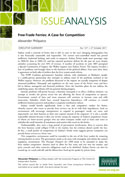
Sydney needs a network of ferries that is able to cater to the city’s changing demographics but is also financially sustainable and responsible. The current state-controlled model has proved inefficient, backward looking, and costly to taxpayers. Sydney Ferries made more passenger trips in 2000–01 than in 2010–10, and has reported persistent deficits for the past six years despite subsidies accounting for over 50% of revenue. A number of accidents in early 2007 prompted a Special Commission of Inquiry (the Walker inquiry) into Sydney Ferries. The inquiry revealed a host of problems and brought them to the forefront of the political debate. Four years later, there is agreement on both sides of politics that the ferry system needs reform.
The NSW Coalition government’s franchise reform, with similarities to Brisbane’s model, is a public-private partnership that attempts to address some of the problems outlined in the Walker inquiry. However, the problems discussed in the inquiry are actually symptoms of deeper structural problems. Monopoly and regulation are the root causes of the ferries’ woes and have led to labour, managerial and financial problems. Since the franchise plans do not address the underlying causes, the reforms will not generate lasting progress.
Instead, problems will persist because a franchise monopoly is in effect a halfway solution—an attempt to involve the private sector but not allowing the forces of competition to operate. Government control of fares and route structure will continue to increase costs and stifle innovation. Subsidies, which have created long-term dependence, will continue to reward inefficient business practices and produce a corporate entitlement culture.
Sydney would benefit significantly from a free and competitive market for ferries, whereby anyone who wants to provide ferry services can do so with little impediment. Such an environment will encourage entrepreneurs to respond to passengers’ needs, cut costs, and importantly, run their business at their own expense instead of the taxpayers’. It is also a socially responsible solution because it does not involve taxing the majority of Sydney’s population who use other transport modes (many of which are lower-income groups) to subsidise the small minority of commuters and tourists who travel on the ferries.
Understandably, after such a long period of government involvement, there is concern that the ferry business could collapse if left to the market, but the evidence doesn’t justify the fear. In fact, a small pocket of competition on Sydney’s Manly route suggests private companies can provide better services at a lower cost.
This competitive environment could be extended to the rest of the ferry market by removing existing barriers to entry. The government needs to do away with monopoly and simultaneously reform the current regulatory environment. The Passenger Transport Act 1990 needs to be amended to make the ferry market competitive. Statutes need to allow for free entry and exit into the market, and price controls and other restrictive obligations need to be relaxed. Sydney Ferries can then be wound up, its vessels sold off, and the labour force freed up for uptake by private firms.
Alexander Philipatos is a Policy Analyst with the Economics Program at The Centre for Independent Studies.









